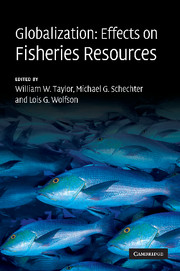Book contents
- Frontmatter
- Contents
- List of contributors
- About the editors
- Foreword
- Preface
- Acknowledgments
- Introduction: Globalization and fisheries: a necessarily interdisciplinary inquiry
- Part I Impacts of globalization on fisheries and aquatic habitats
- Part II Case studies of globalization and fisheries resources
- 7 Possible contributions of globalization in creating and addressing sea horse conservation problems
- 8 Wronging rights and righting wrongs: some lessons on community viability from the colonial era in the Pacific
- 9 Cooperation and conflict between large- and small-scale fisheries: a Southeast Asian example
- 10 Response of Alaskan fishermen to aquaculture and the salmon crisis
- 11 Tilapia: a fish with global reach
- 12 The influence of globalization on the sustainability of North Pacific salmon fisheries
- Part III Governance and multilevel management systems
- Part IV Ethical, economic, and policy implications
- Part V Conclusions and recommendations
- Index
- Plate section
- References
8 - Wronging rights and righting wrongs: some lessons on community viability from the colonial era in the Pacific
Published online by Cambridge University Press: 10 August 2009
- Frontmatter
- Contents
- List of contributors
- About the editors
- Foreword
- Preface
- Acknowledgments
- Introduction: Globalization and fisheries: a necessarily interdisciplinary inquiry
- Part I Impacts of globalization on fisheries and aquatic habitats
- Part II Case studies of globalization and fisheries resources
- 7 Possible contributions of globalization in creating and addressing sea horse conservation problems
- 8 Wronging rights and righting wrongs: some lessons on community viability from the colonial era in the Pacific
- 9 Cooperation and conflict between large- and small-scale fisheries: a Southeast Asian example
- 10 Response of Alaskan fishermen to aquaculture and the salmon crisis
- 11 Tilapia: a fish with global reach
- 12 The influence of globalization on the sustainability of North Pacific salmon fisheries
- Part III Governance and multilevel management systems
- Part IV Ethical, economic, and policy implications
- Part V Conclusions and recommendations
- Index
- Plate section
- References
Summary
INTRODUCTION
The term “globalization” is used to describe an increase to a worldwide scale of the interconnectedness of cultural, environmental, and social phenomena. The term has been applied to commercial, ecological, economic, financial, organizational, religious, spiritual, and trade activities, among a great many other processes and structures. Although identified with various trends that developed largely during the last half-century, it can be argued that the substance of globalization does not connote anything particularly new. In contrast, the speed with which it is now occurring is new, and results from the intensity of modern communications. It is this awesome speed of contemporary communication combined with the portability, increasingly low cost, standardization, and integration of the required hardware and software that now enables the process of globalization to penetrate into the remotest corners of the world, and to tie hitherto isolated fishing communities, for example, into the mainstream of the world fish trade.
But it was not always thus. Although some would argue that the characteristics of globalization can be identified at other times in history, their assertions founder on the issue of communication speed. What can now be achieved with a PDA in every pocket certainly would not have been feasible in the days of sail-borne commerce. Whereas one might agree that the outline of Western commercial, military, and imperial globalization could be traced to the beginnings of the European rampage overseas in the fifteenth century, without lightning-fast communication this outline could not have evolved into globalization as we now understand it.
- Type
- Chapter
- Information
- Globalization: Effects on Fisheries Resources , pp. 215 - 228Publisher: Cambridge University PressPrint publication year: 2007

